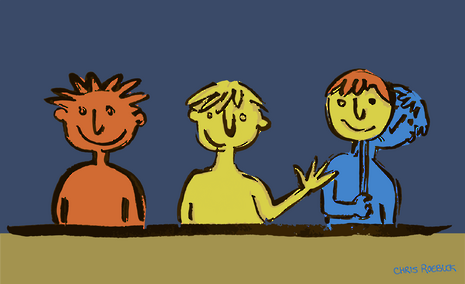Mental health: a new stigma
Courtney Landers argues that a new stigma around depression is replacing the old

One of the biggest conversations in mental health right now is about stigma: what it is, what it means for treatment, and, most of all, how to remove it, so that people can talk about and seek help for mental illness.
There is still a lot of work to be done to reduce and remove stigma surrounding what are seen as ‘more serious’ mental illnesses such as schizophrenia and bipolar disorder.
However, excellent progress has been made for depression and anxiety. Although there are many more people to convince, an increasingly large number of people now accept and understand that depression and anxiety are as legitimate and serious as physical illness.
Our problem now is that a new stigma has replaced the old. In my experience, this is particularly the case for depression. Instead of questioning whether depression is real, some of us now question whether particular individuals really are depressed.
I’ve seen this attitude take two forms.
The first occurs in otherwise supportive family and friends, who may ask: “But are you sure you’re depressed?” In response to my diagnosis, my own mother said: “I don’t think you have depression; you couldn’t have gotten so far in life if you did” (meaning excelling academically and coming to Cambridge).
We have been so successful in establishing depression as a serious illness with serious symptoms that it is frightening in the same way serious physical illnesses are. Our loved ones don’t want depression for us; they don’t want us to suffer.
They also don’t want to think that they’ve missed the signs, that we’ve been struggling alone, and that if we’ve achieved things in spite of being sick, that we’ve done so by overcoming an adversity without their help. This is especially true for families – such as mine – with long histories of depression and anxiety.
Doubt in the form of hope is fairly harmless though; for many of us our loved ones want us to be well and will give us their support.
What truly concerns me is doubt stemming from our awareness of the cult of happiness; the phenomenon where people expect to be happy all the time because society and pop-culture have told them they can be and should be. This kind of doubt can lead to a dismissal of diagnoses of depression (and anxiety) as a form of hysteria or attention-seeking enabled by the marketing behaviours of ‘Big Pharma’.
In part, we have contributed to this new stigma by educating society that happiness isn’t a question of feeling great all the time and that we all experience ups and downs. Those still caught up in the ‘happiness trap’ are thus now often seen as naïve and uninformed, feeding even more into the idea that – like Mrs Bennet with her fluttering nerves – they are simply hysterical and seeking attention.
The stigma of happiness hysteria is dangerous. It increases our risk of neglecting people who are actually ill and in need of support. I’m going to risk sticking my foot in my mouth and suggest that there are individuals, trapped in a kind of hysteria by our society and culture, who think or are told they are mentally ill when they aren’t.
Thing is, these individuals are in no less need of our help. If someone feels so unpleasant they suspect or are told they are depressed, they are just as deserving of care and support as someone whose emotions have flatlined and who is experiencing extreme fatigue. While the latter may need antidepressants and other physical or chemical therapies, the former can be assisted with talking therapies.
Cognitive behavioural therapy, interpersonal therapy and the like are designed to help people deal with things that are upsetting them and learn strategies for being present and mindful.
They’re about learning new approaches to our thoughts and experiences; learning how to cope with and flourish within the ups and downs of life. Someone feeling pain because they’re not as happy as pop culture led them to believe they should be would benefit from these therapies just as much as someone trapped in a cycle of negative thinking about themselves due to trauma, personal or family history, or brain chemistry.
If talking therapies are applied properly and successfully – and they very often are – both individuals will feel better, both will learn resilience tactics for when life inevitably confronts them with tough times, and both will be able to spread the strategies and mindsets they have learned to other people.
Dismiss someone as ‘not really depressed’ and we not only deprive them of the chance to learn and grow, we stifle the spread of resilience and mindfulness throughout society.
 Comment / Plastic pubs: the problem with Cambridge alehouses 5 January 2026
Comment / Plastic pubs: the problem with Cambridge alehouses 5 January 2026 News / News in Brief: Postgrad accom, prestigious prizes, and public support for policies11 January 2026
News / News in Brief: Postgrad accom, prestigious prizes, and public support for policies11 January 2026 Theatre / Camdram publicity needs aquickcamfab11 January 2026
Theatre / Camdram publicity needs aquickcamfab11 January 2026 News / Cambridge academic condemns US operation against Maduro as ‘clearly internationally unlawful’10 January 2026
News / Cambridge academic condemns US operation against Maduro as ‘clearly internationally unlawful’10 January 2026 News / SU stops offering student discounts8 January 2026
News / SU stops offering student discounts8 January 2026









